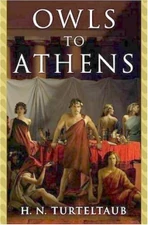Over the Wine-Dark Sea[]
The Gryphon's Skull[]
The Sacred Land[]
Owls to Athens[]
Salamis[]
Alexandros[]
Alexandros was a wounded Macedonian veteran of Alexander the Great's armies. In retirement, he served Ptolemaios as nomarch of Memphis. On arriving in that city, Sostratos approached him about buying olive oil. Alexandros told him to make his sales pitch to the palace cooks; he would defer to their decision on whether to purchase the oil or not. Alexandros claimed that, after years of deprivation on the march and the battlefield, he was indifferent to the quality of his food, only insisting that he have enough of it to avoid going hungry. When Sostratos reached the kitchen, the cooks assured him this was an affectation; Alexandros was no less particular in his tastes than most people.[1]
Antas[]
Antas was an Egyptian cook working in the kitchen of the nomarch's palace in Memphis. He spoke no Greek.[2]
Areton[]
Areton son of Aretakles was captain of the Tykhe, an Egyptian akation dispatched to Rhodes by Ptolemaios following his defeat at the Battle of Salamis. Areton first informed the leadership of Rhodes that Ptolemaios had survived the battle and returned safely to Alexandria. When asked by Komanos whether Ptolemaios would be able to assist Rhodes in the event of an attack by Antigonos and Demetrios, Areton promised that material assistance could be provided, but was forced to concede that the Egyptian navy had sustained too many losses to reinforce Rhodes in the near future.
Areton's orders from Ptolemaios also included inquiring into the fates of Menedemos and Sostratos. By happy coincidence, Menedemos was the first Rhodian he encountered upon arriving in the harbor.[3]
Athanippos[]
Athanippos was a Rhodian dockside lounger. When the Aphrodite returned from its trading run to Alexandria by way of Cyprus, Menedemos hired him to summon Lysistratos to the dock to hear news of great import.[4]
Blepyros[]
Blepyros was the Thrasian captain of an Egyptian warship. Prior to the Battle of Salamis, Menedemos asked him to reassign several sailors to the Aphrodite so that the Rhodian akatos would be fully manned. Blepyros was originally furious at the request, but immediately thawed when he realized that Menedemos only needed six men. Blepyros allowed the Rhodian to pitch his proposal to his crew, and even sweetened it by pointing out that the men were less likely to be killed or wounded aboard a noncombatant vessel. Three men volunteered, and Blephyros ordered three more to transfer.[5]
Demodamas[]
Demodamas was steward of Ptolemaios' palace in Alexandria. His duties included carrying messages from visitors to the palace to Ptolemaios, summoning and escorting them when Ptolemaios wished to see them, and gathering intelligence on visitors to the city.[6]
Diophantes[]
Diophantes was a Greek living in Alexandria. One day Menedemos passed him in the street while Diophantes was wearing a big ol' floppy straw hat. Menedemos stopped him and asked where he could purchase such a hat, as he had just been reflecting that the equatorial sun could be seriously dangerous to a relatively fair-skinned Hellene. Diophantes recommended Marempsemis and told Menedemos to use his name for a discount. Menedemos was unsure whether using Diophantes' name would earn him a discount, but was quite certain it would earn Diophantes a kickback.[7]
Epinikos[]
Epinikos was a Rhodian dockside lounger who accepted small amounts of money to run errands for ship captains and warehouse owners. When Mikkiades mistook Sostratos for a fellow dockside lounger and offered him three oboloi to inform Himilkon of the Corinthian's arrival, Epinikos mocked the ship captain for mistaking the son of Lysistratos for an idler. Mikkiades was horrified, but Sostratos assured both the lounger and the Corinthian that he was not offended, and accepted the job.[8]
Euphemides[]
Euphemides was the captain of a ship in the Egyptian navy. While the navy was at anchor in Sapphos in preparation for its attack on Salamis, Euphemides arrived late for a briefing aboard the flagship. Ptolemaios used sarcasm to express his irritation with the tardy captain.[9]
Exakestos[]
Exakestos was a pretentious Greek wine merchant in Alexandria. Menedemos attempted to sell him some fine wines. Exakestos was unable or unwilling to pay the price Menedemos was asking, but offered to trade frankincense and myrrh for the wine instead. Menedemos was interested, but the two were unable to agree on an exchange rate, and Exakestos also insulted Menedemos by questioning whether he had sealed cheap wine in amphorai and attempted to pass it off as a better quality vintage. Menedemos walked away when he was satisfied there was no point in continuing their dicker, advising Exakestos that the wineseller could look him up at Ptolemaios's palace if he changed his mind.
Menedemos relished the local merchant's alarm when it seemed that Exakestos was afraid to have insulted an important guest of the ruler of Egypt, but he had misread Exakestos's concerns. The wineseller attempted to denounce Menedemos to Demodamas. The steward asked the Rhodian why Exakestos was upset with him, and was satisfied that the wineseller's complaint was frivolous after hearing Menedemos's account of their fruitless meeting. However, the experience of being denounced by an informer disturbed Menedemos, who had always taken for granted the civil liberties afforded by life in a democratic polis, to the core.[10]
Gatisen[]
Gatisen was King of Kus (though Hellenes knew it as Ethiopia). Ptolemaios apparently considered maintaining good relations with the king a high priority, based on Demodamas's greeting to Gatisen's envoy, Harsioteph and the fact that Harsioteph was allowed to jump to the front of the line outside Ptolemaios's audience chamber. Gatisen's capital was in Meroë.[11]
Literary Note[]
The name Gatisen appears on several Nubian ruins and has been conflated by some, but not all, historians with Aktisanes, a Nubian ruler of Kush from the late fourth century BC who is himself described in the writings of the contemporary Greek historian Hecataeus of Abdera. The account in which Aktisanes is described is itself problematic, and the conflation of Gatisen with this figure is even more dubious. As the king's role in the story is so minimal, the editors of this Wiki have decided to include him on the fictional characters list, with this disclaimer attached.
Harsioteph[]
Harsioteph son of Nasakhma was an envoy to Ptolemaios in Alexandria on behalf of King Gatisen of Kus. He was due to meet the ruler of Egypt the same morning that Menedemos and Sostratos had been summoned before their host, and the three men conversed while they waited outside the warlord's audience chamber. Sostratos, an aspiring historian, seized on the opportunity to ask what he could about the cultures of sub-Saharan Africa. Their conversation was short, as Demodamas escorted the diplomat into the audience chamber as soon as the Macedonian marshal was available, despite the fact that several parties of Hellenes had already been in the waiting room before he showed up. One Hellene grumbled that the barbarian should not have been seen till all the Greeks had concluded their business, and his companion opined that Kusians were fit only for slavery. Menedemos (who would see Ptolemaios directly after Harsioteph, also jumping ahead of the other Hellenes in line) responded with the suggestion that Harsioteph would most certainly kill any man who attempted to enslave him.[12]
Hermokrates[]
Hermokrates was a Greek incense dealer based in Alexandria. Menedemos purchased frankincense from him. Hermokrates felt that Menedemos had gotten the better of him in their dicker. Privately Menedemos reflected that this may have been because the Rhodian captain had begun playing dumb for fear of informants who reported people to Ptolemaios's authoritarian government. Of course Menedemos did not let on.[13]
Karneades[]
Karneades was a Rhodian dockside lounger. When the Aphrodite returned from its trading run to Alexandria by way of Cyprus, Menedemos hired him to summon Philodemos to the dock to hear news of great import.[14]
Khamouas[]
Khamouas was a Greek-speaking Egyptian cook who worked in the kitchen of the nomarch's palace in Memphis. As an Egyptian, he was disgusted by olive oil, and expressed this when his colleague Rhodoios negotiated to buy some from Sostratos, but did so good-naturedly. Sostratos found the cook so disarming that he asked if Khamouas could recommend a tour guide to take him and his men to visit the |Pyramids. Khamouas recommended his kinsman Pakebkis.[15]
Khryse[]
Khryse, meaning "The Golden One," was the name given to a beautiful Celtic woman who'd been enslaved and sold to the Rhodian brothelmaster Simaristos. Menedemos engaged her services one afternoon and paid her owner eight drakhmai of silver in order to spend the rest of the day sharing a bedchamber with her. After their first round of lovemaking, Menedemos engaged her in personal conversation. He learned that the thing she most wanted to do was return to her family, but realized that, even if she could, they would ostracize her since she had been forced into prostitution, and also that chances were high she'd simply be enslaved again. Menedemos developed real empathy for the plight of slaves for the first time. He paid her two drakhmai of silver and told her that he sincerely hoped she would be able to retake control of her life. She was grateful for the kind gesture but she couldn't even be confident that she'd be able to keep his gratuity; if Simaristos discovered it he would take it from her. As he left she told him that, if he wanted to hire her again, she would not be disappointed, as she found him less objectionable than many of the men she'd been forced to sleep with.[16]
Lydos[]
Lydos was an elderly Lykian slave who acted as man of affairs to Komanos. As the most senior slave in the home of Rhodes' most prominent citizen, he lived a life of rare privilege by slaves' standards, and even free men felt obliged to show him a certain measure of respect.[17]
Lyke[]
Lyke was the Greek name given to a Lykian woman enslaved in the house of Philodemos. Lyke was a handmaiden to Baukis. When Baukis and Menedemos were speculating about the fate of people whose polis had been conquered, Lyke volunteered her perspective. She said that life in bondage was always grim, though some slaveholders were worse than others. Based on things she'd heard speaking with other slaves from other Rhodian houses, she believed Philodemos was probably one of the less bad. Menedemos asked her when she encountered slaves from other households, she explained that slaves congregated while fetching water from the nearby fountain, while shopping, and during religious festivals.[18]
Marempsemis[]
Marempsemis was an Egyptian hatter living and working in Alexandria. Menedemos purchased a big ol' floppy straw hat from him. The Rhodian sailor mentioned that he'd gotten a referral from Diophantes. At the mention of that name, Marempsemis claimed that, for a friend of Diophantes, he would discount a hat from four oboloi to three and a half. Menedemos suspected that the hatter had actually raised his price from three oboloi in order to pay Diophantes's kickback, but he still considered it a fair price, and completed the purchase.[19]
Mikkiades[]
Mikkiades was a Corinthian merchant whose ship visited Rhodes. He mistook Sostratos for a dockside lounger and offered him three oboloi to inform Himilkon that he had arrived. When a genuine dockside lounger informed Mikkiades that Sostratos was the son of Lysistratos, the Corinthian was horrified that he had insulted the son of such a prominent man. Sostratos assured Mikkiades that he was not offended, and accepted his silver in exchange for delivering the message, since he wanted to see Himilkon himself anyway.[20]
Nikodromos[]
Nikodromos was a Hellene who worked as one of two secretaries to Alexandros, the nomarch of Memphis. His colleague was a Greek-speaking Egyptian.[21]
Pakebkis[]
Pakebkis was an Egyptian merchant and caravan master based in Memphis. He ran a side business guiding visitors to the city on tours of the |Pyramids. Sostratos hired him to take himself and five of the Aphrodite's sailors on a tour, after asking Khamouas to recommend a tour guide. (Khamouas and Pakebkis were kinsmen.)[22]
Paramonos[]
Paramonos son of Khairemon was a Cypriot fisherman who visited Rhodes early in the winter after the Battle of Salamis. He encountered Sostratos at the harbor and indicated that he had news of great interest to the Rhodians concerning the intentions of the Cypriot kings. Sostratos paid him to share his news and learned that Antigonos and Demetrios were following up their victory on Cyprus with a full scale invasion of Egypt. Sostratos asked Paramonos to accompany him to the home of Komanos to share the news with the city's leading statesman. Sostratos promised to pay Paramonos more money if Komanos did not do so himself, and this persuaded Paramonos to leave his sons and nephew in charge of selling the fish they'd caught till he got back. Komanos paid Paramonos generously upon learning the disturbing news. Komanos invited the Cypriot to dine with him, but Paramonos politely declined and returned to his boat.[23]
Pasos[]
Pasos was an Egyptian boatman who owned and operated a barge on the Nile. Sostratos hired Pasos to transport himself, five Rhodian sailors, and the Aphrodite's cargo of olive oil from Alexandria to Memphis. During the slow days-long journey, Sostratos, an aspiring historian, asked the Egyptian many questions about his country's history and culture.[24]
Philippos[]
Philippos was a Macedonian officer assigned to the naval harbor of Alexandria. When a sentry who reported to him became suspicious that Menedemos was a spy, Menedemos produced a letter from Ptolemaios granting him access to the harbor. The sentry was illiterate and had to fetch Philippos to read the letter and verify Menedemos's story, which Philippos did. The officer ordered the sentry to let Menedemos pass, commended his subordinate for showing due diligence then left. The sentry had worried that Philippos would punish him for interrupting something that the officer deemed more important, and was relieved by Philippos's commendation.[25]
Polyaratos[]
Polyaratos was a Rhodian farmer who attended a citizens' assembly where Demetrios proposed an alliance between the city of Rhodes and Antigonos. After Demetrios had finished speaking, Komanos opened the assembly to citizens. Polyaratos spoke second, following a long-winded monologue by Xanthos encouraging his compatriots to reject the offer and maintain their city's independence. Polyaratos, by contrast, spoke out in favor of the alliance, and praised Antigonos and Demetrios with such fervor that Menedemos and Sostratos suspected he'd taken a bribe from them.[26]
Psaphon[]
Psaphon son of Zoilos was the son of a Greek merchant living in the Egyptian city of Memphis. He and his father did business with Sostratos during the Rhodian's visit to the city. Like many Greeks, he was named in honor of his paternal grandfather.[27]
Psosneus[]
Psosneus was a Greek-speaking Egyptian who owned a warehouse in Memphis. On Pasos' recommendation, Sostratos contracted with him to store the amphorai of olive oil that the Rhodian had come up the Nile to sell.[28]
Rhodoios[]
Rhodoios was a Greek cook employed in the kitchen of the nomarch's palace in Memphis. When Sostratos visited the city, he asked if Rhodoios were from Rhodes, and in an amazing coincidence, learned that not only was the cook a Rhodian, but also a native of the village of Ialysos, and even that he remembered Sostratos's brother-in-law Damonax as a stuck-up but attractive youth. Sostratos then offered him a sample of olive oil produced on Damoax's estate, and the taste of it left the cook so awash in nostalgia that he bought half of his fellow Rhodian's inventory after barely bothering to haggle. After all, he was spending not his own money, but Alexandros's, and the nomarch was a wealthy man.[29]
Seseset[]
Seseset was an Egyptian woman from the Upper Nile River Delta. She obtained employment at Ptolemaios's palace in Alexandria through the efforts of an uncle, a palace baker.
Shortly after she began her service in Alexandria, she accepted a silver drakhm from Menedemos in exchange for sex. When she first saw him naked she burst into laughter, and when prompted, explained in her limited Greek that he was the first uncircumcised adult man she'd ever encountered. Despite the ensuing awkwardness, she satisfied the |Rhodian sailor and merchant. She sold herself to both Menedemos and Sostratos on a semi-regular basis for the remainder of their stay in Alexandria.[30]
Over the course of his time in Alexandria, Menedemos became increasingly wary of informants who might report his movements to Ptolemaios. This wariness temporarily led him to avoid Seseset. However, he rehired her after a short time. She told him she had assumed he'd either left the palace or found another servant who appealed to him more, but was happy to resume their relationship. [31]
Simaristos[]
Simaristos was the owner of the most exclusive brothel in Rhodes. In addition to beautiful women (all of whom were enslaved) he offered his customers fine wine, exquisite opson, and his own brand of hospitality. His regular clients included Menedemos.[32]
When Sostratos suggested to Komanos that Rhodes might be able to curry favor with Demetrios by offering him beautiful prostitutes, Komanos made a note to speak with Simaristos.[33]
Simias[]
Simias was a Rhodian dockside lounger. When the Aphrodite returned from its trading run to Alexandria by way of Cyprus, Menedemos hired him to summon Komanos to the dock to hear news of great import.[34]
Xanthe[]
Xanthe was the Greek name given to a slave in Philodemos's house. She was a handmaiden to Baukis.[35]
Xanthiades[]
Xanthiades was the infant son of a niece or great-niece of Xanthos. His mother apparently named him in an attempt to curry favor with her wealthy kinsman. Xanthiades was born about the same time as Diodoros, but was a sickly infant who died just a few months after his birth.
The baby's death greatly upset his namesake, who, true to his nature, talked through his grief at great length. Friends like Philodemos showed more patience for Xanthos' lengthy orations than usual in this case.[36]
Xenopheles[]
Xenopheles son of Xenon was a Greek who had visited the |Pyramids in Egypt at some point before Sostratos did the same. He scratched a graffito onto the arm of the Great Sphinx that read "I, Xenopheles son of Xenon, wrote this." Underneath was another graffito saying 'So did I, Knife son of Nobody."[37]
Zoilos[]
Zoilos son of Psaphon was a Greek merchant living in Memphis. On Rhodoios's recommendation, Sostratos approached Zoilos to sell the olive oil remaining in his inventory after Rhodoios bought half of it for the nomarch's palace. Zoilos, his son Psaphon, and Sostratos sampled the oil with some bread that Zoilos's wife had just baked. Zoilos was interested in purchasing the oil, and he and Sostratos were able to reach a mutually acceptable price after some friendly haggling interspersed with anecdotes from Sostratos's travels.
Zoilos then asked what else Sostratos had to trade, and Sostratos showed him a box containing pieces of amber, including one piece with an insect trapped inside. Zoilos had seen amber once before, including a piece with a portion of a fern trapped within. The two merchants puzzled over how such things came to be inside solid rock but were unable to come up with an explanation. Zoilos offered to barter Sostratos's entire stock of amber for an ancient Egyptian necklace made from gold and lapis lazuli. Sostratos found it stunning and was in awe of its age and mysterious origin. So impressed was the Rhodian that he protested that it was too valuable to trade for the amber, going against his mercantile nature. Zoilos assured Sostratos that, this far south, amber was more valuable than it was in Hellas, while Egyptian artifacts were less so; and besides, he expected to have the opportunity to purchase a similar piece in the future. At this point he warned Sostratos that another reason he was willing to trade the necklace at a discount was that it was illegal to own; he heavily implied that he had acquired it from a tomb robber. Thus, Sostratos would have to keep the necklace well hidden till he'd left Egypt. Sostratos accepted the trade; he was not ethically opposed to black market deals of this sort, and in fact the amber was also illegal, as the tokharkos had not included it in his customs declaration on arriving in Alexandria.
References[]
- ↑ Salamis (novel), Ebook Ch 8
- ↑ Salamis (novel), Ebook Ch 8
- ↑ Salamis (novel), Ebook ch 15
- ↑ Salamis (novel), Ebook Ch 14
- ↑ Salamis (novel), Ebook Ch 10
- ↑ Salamis (novel), Ebook Ch 4, 5, 7
- ↑ Salamis (novel), Ebook Ch 5
- ↑ Salamis (novel), Ebook Ch 15
- ↑ Salamis (novel), Ebook Ch 11
- ↑ Salamis (novel), Ebook Ch 7
- ↑ Salamis (novel), Ebook Ch 5
- ↑ Salamis (novel), Ebook Ch 5
- ↑ Salamis (novel), Ebook Ch 18
- ↑ Salamis (novel), Ebook Ch 14
- ↑ Salamis (novel), Ebook Ch 8
- ↑ Salamis (novel), Ebook Ch 17
- ↑ Salamis (novel), Ebook Ch 17
- ↑ Salamis (novel), Ebook Ch 16
- ↑ Salamis (novel), Ebook Ch 5
- ↑ Salamis (novel), Ebook Ch 15
- ↑ Salamis (novel), Ebook Ch 8
- ↑ Salamis (novel), Ebook Ch 8
- ↑ Salamis (novel), Ebook Ch 17
- ↑ Salamis (novel), Ebook Ch 6
- ↑ Salamis (novel), Ebook Ch 6
- ↑ Salamis (novel), Ebook Ch 1
- ↑ Salamis (novel), Ebook Ch 9
- ↑ Salamis (novel), Ebook Ch 7
- ↑ Salamis (novel), Ebook Ch 8
- ↑ Salamis (novel), Ebook Ch 4-5.
- ↑ ibid Ch 8
- ↑ Salamis (novel), Ebook Ch 17
- ↑ ibid
- ↑ Salamis (novel), Ebook Ch 14
- ↑ Salamis (novel), Ebook Ch 15
- ↑ Salamis (novel), Ebook ch 18
- ↑ Salamis (novel), Ebook Ch 8
| |||||||||||||




